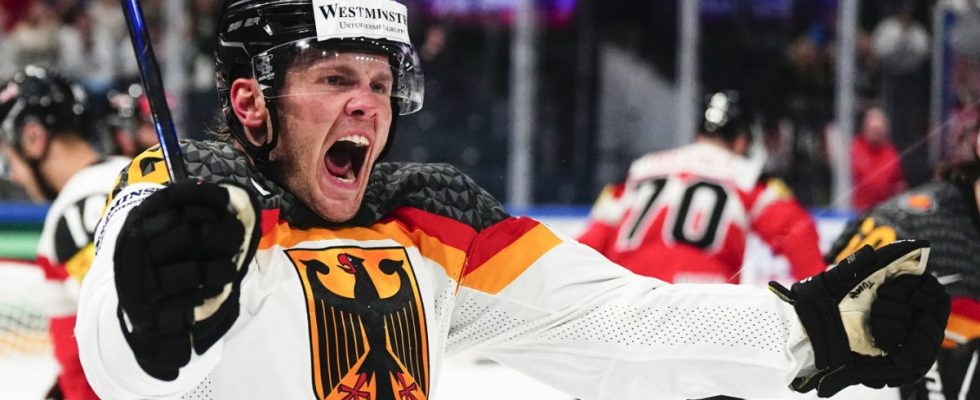It could all be so easy. Not to say: simply simple. “We just want to play,” said Parker Tuomie after the German team’s 4-2 win over Austria at the Ice Hockey World Championships in Tampere. It was a hard-earned success, admitted national coach Harold Kreis, who brought the team of the German Ice Hockey Federation in Group A with six points to fifth place and at least close to the quarter-finals.
When looking for other positive aspects of this mandatory win against the bottom of the table, you quickly arrived at two rows that stand less for art than for solid craftsmanship. On the one hand, the trio around NHL professional Nico Sturm, who played a key role in the sense of achievement against Austria with two goals to make it 1-0 and 4-2. On the other hand, the series with the Straubinger Tuomie, the Munich Justin Schütz and the Ingolstadt Wojciech Stachowiak, three World Cup debutants.
Tuomie brought the German team back into the lead after the Austrians were 1-1, Stachowiak extended it with a wonderful solo run through the Austrian third; Schütz, who had already scored his first World Cup goal in the 2-3 win against the USA, gave him the space he needed with a tough duel in front of goal. “Tonight was our evening,” said Tuomie. Nobody objected.
Even if coaches and players emphasize that the numbering from one to four does not mean a hierarchical gradation: the nominal fourth row is primarily expected not to produce any disc losses and to keep the opponent busy. But this fourth row didn’t just come into its own against Austria. “It’s a hard-working line,” Kreis says. “If you can’t make a play, put the disc in a safe area where you can do a good forecheck and handle the disc carefully. They’re playing the game right.”
Stachowiak, who was born in Danzig, was voted the best German player of the evening and was glowing with happiness: “It was a dream of mine, and now, at 23, it’s the greatest experience I’ve ever had as an ice hockey player.”
“Parker is a real poison dwarf,” says Nico Sturm about Tuomie
The three novices in the mixed zone grinned like middle school students in the last row of benches and passed balls to each other in the interviews. “We actually only knew each other from the national team, but it worked really well right away,” said Schütz. Stachowiak explained: “We have fun together, the chemistry is right.” Tuomie admitted that there had been a few, well, points of contact beforehand: “Justin and I have had tough moments against each other in the league, especially in the derbies between Munich and Straubing. We understand each other all the better here .” How it comes? “We communicate a lot, even after every change. We keep the game simple.”
“Parker is a real poison dwarf,” said Nico Sturm with a smile. “It’s very uncomfortable to play against him. But you can also see that he can do something brutal on the disc. He’s very hardworking and an outstanding skater. The series works great.”
Despite all the praise for the fourth row and his own row, Sturm admitted that the win against Austria was anything but brilliant: “It wasn’t our best game.” Only 24 hours after the physically and mentally draining 6:4 against Denmark, the team found it difficult “to bring this bite and this attention to detail back onto the plate against an opponent who was fresh and highly motivated”. Nevertheless, it is “always a good sign when a team finds a way to score three points, even if they don’t play their best game.”
The national coach saw it similarly. “It was tedious,” said Harold Kreis. “It wasn’t a game like we usually play, with target control and clean plays. We missed a few targets in the defensive zone. There were too many turnovers, but it’s still three points.”
Kreis is worried about his supposed top row with John-Jason Peterka, Dominik Kahun and Marcel Noebels. “The nominal front row is under a lot of pressure,” said Kreis. “We’re trying to soften that a bit. We’re like, ‘Guys, play our game’, don’t take that much risk.” Without specifically addressing the front row, Sturm said: “When we were in danger, it was always the result of our own sloppiness, because we wanted to make the whole thing too complicated. We shouldn’t make so many faxes with the disc on the blue line. It’s very dangerous in a game like today.”
In the last third against Austria, the coaches used NHL professional Peterka, who has scored two tournament goals so far, only sporadically. He doesn’t know why, said Peterka as he trudged through the mixed zone after the game. Kreis later gave the diplomatic answer: “We had the feeling that he couldn’t develop his game like that today.” In any case, an injury was not the reason.
Against Hungary on Sunday (3:20 p.m., Sport1 and Magentasport) there should be personnel changes, Kreis indicated: “We will go over the books and see what we can do.” Presumably he will gently explain to Peterka, 21, who had a strong debut season in the NHL, that he should orient himself towards Stanley Cup winner Sturm. “Nico is an absolute professional, in game preparation, in the weight room. We see in the meetings how focused he is,” said Kreis. “He really is a role model for everyone.”
The example advised modesty. “We have always had success when we played our simple ice hockey,” said Sturm. “We should hold on to the mantra.”
Parker Tuomie expects a “brutally tough game” against Hungary. Even world champion and Olympic champion Finland had a hard time against the promoted team on Friday. The 7:1 at the end was deceptive: after two thirds the Finns were just 2:1 ahead. “We can’t allow counterattacks,” said Tuomie. Put more simply: “Simple is the right way.”

